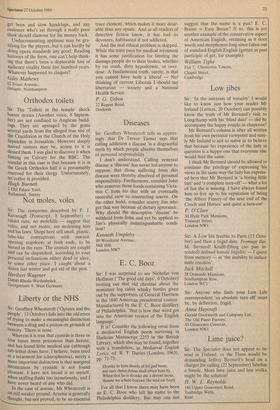Liberty or the NHS
Sir: Geoffrey Wheatcroft (`Opiates and the People', 13 October) falls into the old error of trying to make a meaningful distinction between a drug and a poison on grounds of toxicity. There is none.
Whereas it is true that cyanide is three or four times more poisonous than heroin, and has found little medical use (although sub-lethal doses have, I believe, been tried as a treatment for schizophrenia), surely a more important distinction is that marginal intoxication by cyanide is not found pleasant. I have not found it so mygelf, When sniffing flasks too incautiously, and I have never heard of any who did.
In the case of arsenic, Mr Wheatcroft is on still weaker ground. Arsenic is generally N.....t_hought, but not proved, to be an essential
trace element, which makes it more desir- able than any opiate. And as all readers of detective fiction know, it has had its devotees, habituated if not addicted.
And the real ethical problem is skipped. While the state pays for medical treatment it has some justification for limiting the damage people do to their bodies, whether by car crash, dirty hypodermic, or over- dose. A fundamental truth, surely, is that you cannot have both a liberal — No! thinking of current Liberals I should say libertarian — society and a National Health Service.
P. G. Urben
22 Regent Road, Gosforth


















































 Previous page
Previous page